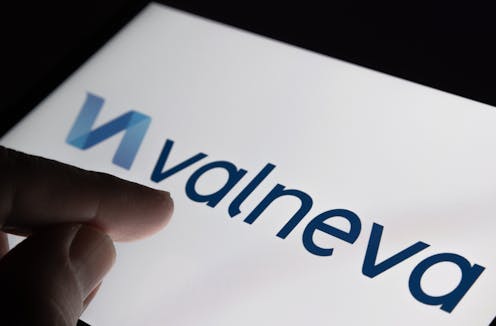What's the Valneva COVID-19 vaccine, the French shot that's supposed to be 'variant proof'?
- Written by Adam Taylor, Early Career Research Leader, Emerging Viruses, Inflammation and Therapeutics Group, Menzies Health Institute Queensland, Griffith University

A COVID-19 vaccine from French company Valneva has yet to complete clinical trials. But it has caught the eye of governments in the UK, Europe and Australia.
One of the vaccine’s main selling points is its apparent ability to mount a more general immune response against SARS-CoV-2, the virus that causes COVID-19, rather than rely on the spike protein to do this.
This means the vaccine is more likely to be effective against the type of virus variants we’ve already seen emerging, and may emerge in the future. Some reports describe it as “variant proof”.
The hope is vaccines using this technology would be able to provide protection for longer, rather than keep being reformulated to get ahead of these new variants.
How does it work?
Valneva’s vaccine, called VLA2001, is based on tried and tested vaccine technology. It’s the technology used in the vaccine against poliovirus and in some types of flu vaccines. And the company already has a commercially available Japanese encephalitis vaccine based on the same technology.
VLA2001 uses an inactivated version of the whole virus, which cannot replicate or cause disease.
The virus is inactivated using a chemical called beta-propiolactone or BPL. This is widely used to inactivate other viruses for vaccines. It was even used to make experimental versions of vaccines against SARS-CoV, the virus that caused SARS (severe acute respiratory syndrome).
This type of inactivation is expected to preserve the structure of the viral proteins, as they would occur in nature. This means the immune system will be presented with something similar to what occurs naturally, and mount a strong immune response.
Read more: From adenoviruses to RNA: the pros and cons of different COVID vaccine technologies
After being inactivated, the vaccine would be highly purified. Then, an adjuvant (an immune stimulant) is added to induce a strong immune response.
VLA2001 isn’t the first inactivated vaccine against COVID-19. Leading COVID-19 inactivated vaccines, such as those developed by Sinopharm and Bharat Biotech, have been approved for use in China and received emergency approval in other countries, including India.
However, VLA2001 is the only COVID-19 vaccine candidate using whole inactivated virus in clinical trials in the UK and in mainland Europe.
What are the benefits we know so far?
This approach to vaccine development presents the immune system with all of the structural components of the SARS-CoV-2 virus, not just the spike protein, as many other COVID-19 vaccines do.
So Valneva’s vaccine is thought to produce a more broadly protective immune response. That is, antibodies and cells of the immune system are able to recognise and neutralise more pieces of the virus than just the spike protein.
As a result, Valneva’s vaccine could be more effective at tackling emerging COVID-19 virus variants and, if approved, play a useful role as a booster vaccine.
Valneva’s vaccine can be stored at standard cold-chain conditions (2-8℃) and is expected to be given as two shots.
How about results from clinical trials?
According to the company, no safety concerns or serious adverse events were associated with VLA2001 in early-stage clinical trials.
VLA2001 was given as a low, medium or high dose in these trials with all participants in the high-dose group generating antibodies to the virus spike protein.
One measure of immune response in the high-dose group after completing the two doses indicated antibody levels were, after two weeks, at least as high as those seen in patients naturally infected with SARS-CoV-2.
Interestingly, VLA2001 induced immune responses against a number of virus proteins (including the spike protein) across all participants, an encouraging sign the vaccine can provide broad protection against COVID-19.
The vaccine has since advanced to phase 3 clinical trials in the UK. The trial, which started in April 2021, will compare its safety and efficacy with the AstraZeneca vaccine.
The phase 3 trial is expected to be completed by the northern hemisphere’s autumn this year. And if successful, would be submitted for regulatory approval after that.
Who’s interested?
Despite phase 3 clinical trials only just starting, the UK government has pre-ordered more than 100 million doses of the vaccine from Valneva, with the option of buying more down the track. If trials prove successful and pass regulatory approval, this means the vaccine could be used as a booster in time for this year’s northern hemisphere’s winter.
Australia has confirmed it’s also in talks with Valeneva about importing the vaccine. Some countries in Europe are also reportedly keen to strike a deal.
As new cases of COVID-19 increase globally, we’ll continue to see new viral variants emerge that threaten to escape the protection existing vaccines offer.
Already, we are seeing vaccines from companies such as Moderna and Novavax begin to reformulate their spike protein-based vaccines to get ahead of emerging variants.
So Valneva’s vaccine, with the potential to elicit a more broadly protective immune response, may prove to be a useful tool to combat the rise of the virus and its mutations. However, whether the vaccine is really “variant proof” or merely less affected by emerging variants remains to be seen.
Authors: Adam Taylor, Early Career Research Leader, Emerging Viruses, Inflammation and Therapeutics Group, Menzies Health Institute Queensland, Griffith University





